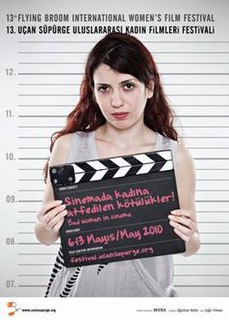The Flying Broom (Turkish : Uçan Süpürge) is a feminist organization in Turkey. Founded 1996 in Ankara, the organization aims to raise consciousness for gender equality while providing information and training to empower women.

Turkish, also referred to as Istanbul Turkish, is the most widely spoken of the Turkic languages, with around ten to fifteen million native speakers in Southeast Europe and sixty to sixty-five million native speakers in Western Asia. Outside Turkey, significant smaller groups of speakers exist in Germany, Bulgaria, North Macedonia, Northern Cyprus, Greece, the Caucasus, and other parts of Europe and Central Asia. Cyprus has requested that the European Union add Turkish as an official language, even though Turkey is not a member state.
Feminism is a range of political movements, ideologies, and social movements that share a common goal: to define, establish, and achieve political, economic, personal, and social gender equality. This includes fighting gender stereotypes and seeking to establish educational and professional opportunities for women that are equal to those for men.

Turkey, officially the Republic of Turkey, is a transcontinental country located mainly in Western Asia, with a smaller portion on the Balkan Peninsula in Southeast Europe. East Thrace, located in Europe, is separated from Anatolia by the Sea of Marmara, the Bosphorous strait and the Dardanelles. Turkey is bordered by Greece and Bulgaria to its northwest; Georgia to its northeast; Armenia, the Azerbaijani exclave of Nakhchivan and Iran to the east; and Iraq and Syria to the south. Istanbul is the largest city, but more central Ankara is the capital. Approximately 70 to 80 per cent of the country's citizens identify as Turkish. Kurds are the largest minority; the size of the Kurdish population is a subject of dispute with estimates placing the figure at anywhere from 12 to 25 per cent of the population.
Most recognized for its annual International Women's Film Festival, the Flying Broom has launched several projects in different areas within Turkish civil society. It was particularly influential in the 2005 amendment of the Turkish penal code, turning violent crimes against women into crimes against the victim itself rather than against crimes against property of the family or society. [1]
The Flying Broom International Women's Film Festival is an annual Ankara-based film festival celebrating women's contributions to filmmaking.
Civil society can be understood as the "third sector" of society, distinct from government and business, and including the family and the private sphere. By other authors, "civil society" is used in the sense of 1) the aggregate of non-governmental organizations and institutions that manifest interests and will of citizens or 2) individuals and organizations in a society which are independent of the government.
The organization was founded in 1996 by Halime Güner and two feminist academics Filiz Kardam and Yıldız Ecevit to revitalize the stalling Turkish feminist movement of the 1990s. Since 1998 it has published the bimonthly magazine Uçan Haber ("Flying News"). [2]
The organization's projects include:
- Database of Women's organizations in Turkey
- Network of Local Women Reporters
- Women's Website Project
- Gender awareness program "Building bridges" (Köprüler Kuruyoruz)
- From paths to roads
- International Women's Film Festival
- Academic conferences at Ankara's Middle East Technical University
- Radio and television programs

Middle East Technical University is a public technical university located in Ankara, Turkey. The university puts special emphasis on research and education in engineering and natural sciences, offering about 40 undergraduate programs within 5 faculties, and 97 masters and 62 doctorate programs within 5 graduate schools. The main campus of METU spans an area of 11,100 acres (4,500 ha), comprising, in addition to academic and auxiliary facilities, a forest area of 7,500 acres (3,000 ha), and the natural lake Eymir. METU has more than 120,000 alumni worldwide. The official language of instruction at METU is English.
The organization also prepared reports on the situation of women in Turkey for the U.N. Fourth World Conference on Women, 1995 in Beijing. [2]

The United Nations (UN) is an intergovernmental organization that was tasked to maintain international peace and security, develop friendly relations among nations, achieve international co-operation and be a centre for harmonizing the actions of nations. The headquarters of the UN is in Manhattan, New York City, and is subject to extraterritoriality. Further main offices are situated in Geneva, Nairobi, and Vienna. The organization is financed by assessed and voluntary contributions from its member states. Its objectives include maintaining international peace and security, protecting human rights, delivering humanitarian aid, promoting sustainable development and upholding international law. The UN is the largest, most familiar, most internationally represented and most powerful intergovernmental organization in the world. In 24 October 1945, at the end of World War II, the organization was established with the aim of preventing future wars. At its founding, the UN had 51 member states; there are now 193. The UN is the successor of the ineffective League of Nations.
Currently, the organization is lead coordinator of the EU funded Civil Society Dialogue project "Watch Your Shadow" (Gölge Meclis), which aims at increasing the participation of women in local politics. [3]

The European Union (EU) is a political and economic union of 28 member states that are located primarily in Europe. It has an area of 4,475,757 km2 (1,728,099 sq mi) and an estimated population of about 513 million. The EU has developed an internal single market through a standardised system of laws that apply in all member states in those matters, and only those matters, where members have agreed to act as one. EU policies aim to ensure the free movement of people, goods, services and capital within the internal market, enact legislation in justice and home affairs and maintain common policies on trade, agriculture, fisheries and regional development. For travel within the Schengen Area, passport controls have been abolished. A monetary union was established in 1999 and came into full force in 2002 and is composed of 19 EU member states which use the euro currency.




